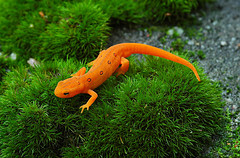 I’ll give you some hints. Just a few days ago, a man walked on a stage a few hundred yards from where I sit to accept an honorary degree in science. Following is the speech that preceded the award:
I’ll give you some hints. Just a few days ago, a man walked on a stage a few hundred yards from where I sit to accept an honorary degree in science. Following is the speech that preceded the award:
As Einstein is to relativity you are to biodiversity — the insight that our world is unimaginatively rich in its number of species, whose lives are inextricably woven together. This idea has powered much subsequent biological research and re-shaped forever human understanding of the world and our place within it. This intellectual journey began, as so often in science, with a child’s curiosity — in your case with the ants you collected in the series of Southern towns in which you were raised. Your fascination in the face of nature’s detail led to your adult study of how species adapt to their surroundings and how genes and culture interact to affect social behavior. Most recently you have inspired the growing inquiry into the vast array of species with which we share this planet and into the delicate web that holds together all life. In doing so you have fathered the modern environmental movement and inspired countless scientists with the knowledge that there is so very much more of life to be discovered. Like Einstein you, too, are dedicated to unifying ideas across the disciplines — to finding those areas in which science, humanities, and social sciences converge — and to exploring how science can best inform religion, morality, and ethics. And, as relativity shaped so much of the human agenda of the Twentieth Century, so biodiversity stands poised to do in the Twenty-First — providing head-spinning new insights along with the sober realization that upon the use we make of this knowledge hangs the very existence of human life.
Calling someone Einstein can be the ultimate compliment or insult, depending on voice inflection and eyebrow position. This particular scholar was not very good at math, calculus in particular. Inversely, Einstein was incapable of doing what this scientist has done. The comparison is a good example of the diversity of the quality that IQ tests do such an inadequate job of quantifying.
The orange color of the red eft serves some evolutionary purpose. While walking in the woods here, I also noted an orange slug and an orange-colored fungus. Bright colors often advertise toxicity. I wonder which of these three are actually toxic and which are just imitating the toxic one?
 I'll give you some hints. Just a few days ago, a man walked on a stage a few hundred yards from where I sit to accept an honorary degree in science. Following is the speech that preceded the award:
I'll give you some hints. Just a few days ago, a man walked on a stage a few hundred yards from where I sit to accept an honorary degree in science. Following is the speech that preceded the award:
